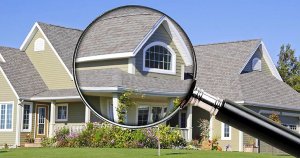 After the home inspection process in The Roanoke Valley, there are likely some repairs a buyer will want to have made. But what are the things you should ask to have fixed and what things should you take care of yourself? In our latest post, we’ll help you determine what to request be fixed and what items you should accept as-is.
After the home inspection process in The Roanoke Valley, there are likely some repairs a buyer will want to have made. But what are the things you should ask to have fixed and what things should you take care of yourself? In our latest post, we’ll help you determine what to request be fixed and what items you should accept as-is.
When it comes to requesting repairs, you should typically only expect major things to be fixed. Items that will have an adverse effect on your enjoyment of the home. You don’t want to be too demanding and lose out on the house.
You are not creating a massive punch list of items to fix before move-in. Cosmetic fixes of any sort should be left alone. However, there are certain fixes your lender might require before releasing the funds.
After the Home Inspection in The Roanoke Valley: What to Fix and What to Forget
Typically, you should expect/ask for the following to be covered…
Structural Issues – This includes large cracks in the foundation and other things that can turn into much larger problems. Some settling is common and can be seen in small “hair line” cracks around doors and windows, which is normal in an older home. However, if some doors are misaligned and there are significant cracks throughout, it might be a sign of a bigger issue. Calling in a structural engineer would be a good idea if there are major structural issues.
Code Violations – A licensed home inspector does not enforce the local building code. However, they can determine if there is a safety concern. You should also be suspicious if the county lists a home with say 3 bedrooms, but when you view the house, there are 4. This likely means the proper permits were not pulled during construction, or during an addition or upgrade.
Electric – Obviously electricity is a requirement to live in the house. If there are any electrical problems – such as exposed wire connections, improper connections, double-tapped breakers, or improperly powered appliances – they should be resolved before the sale is final.
AC/Heat – Air Conditioning and heat are major necessities (especially in certain climates!). And issues with the functionality should be addressed and repaired by the seller.
Plumbing – This is another biggie that the seller should take care of before move-in. Plumbing leaks, or improper connections or venting, can lead to much greater damage down the road.
Pests – Any termite, rodent or other pest problem should be addressed by the seller before moving in. Lenders will not make a loan on a home with active wood-destroying insect infestations, and most reasonable sellers will agree to this!
And these should be left alone…
Cosmetic Flaws – While a good seller will take care of paint, cracked windows, dirty carpets, or a missing baseboard, in order to have the home show great while on the market. However, if a seller is not willing to repair these items prior to marketing, and you really want the house the way that it is, you can expect to repair these cosmetic items after you own the house.
Anything Less Than $100 – It would be great to move into a perfect house, but unless you are buying new, that will rarely be the case. Know this before you buy. You should be prepared to take care of small repairs on your own. Asking for these things to be fixed will only make you appear high-maintenance and might cause the seller to look at the next offer.
Other Small Repairs – Don’t assume that because a light switch isn’t working that the electrical system has gone bad. Often times, these things are easily repaired. Your inspector will let you know if you should be worried about a larger problem.
Yard Maintenance – The yard will typically be sold “as-is.” many sellers pay a lot of attention to the lawn and shrubs so that the home shows well. But, unless there is a major safety concern (like a massive hole in the front yard) you can’t expect any cleaning or outdoor upgrades to be done by the seller.
When negotiating repairs after the home inspection, the process will be “give and take.” You cannot expect a seller to fix every detail nor should you buy a house with major structural or mechanical problems. Have the seller fix the big stuff, but take care of smaller things on your own!
DISCLAIMER: Patrick C. Wilkinson is a licensed Class A Contractor in Virginia with Cross Properties, Inc. and a licensed Real Estate Broker in Virginia with The Real Estate Group. However, he is not an attorney, accountant, appraiser, CPA, financial advisor, home inspector, psychiatrist, psychologist, social worker, or medical doctor. We suggest hiring competent professionals for any legal, financial, or medical advice.
